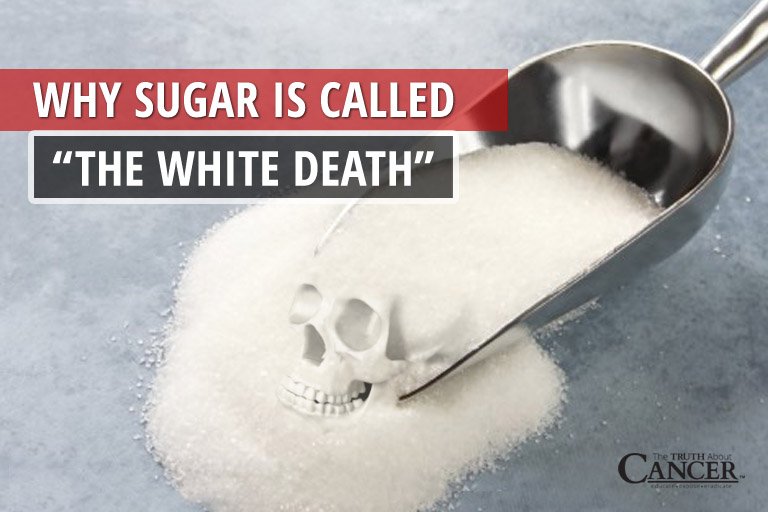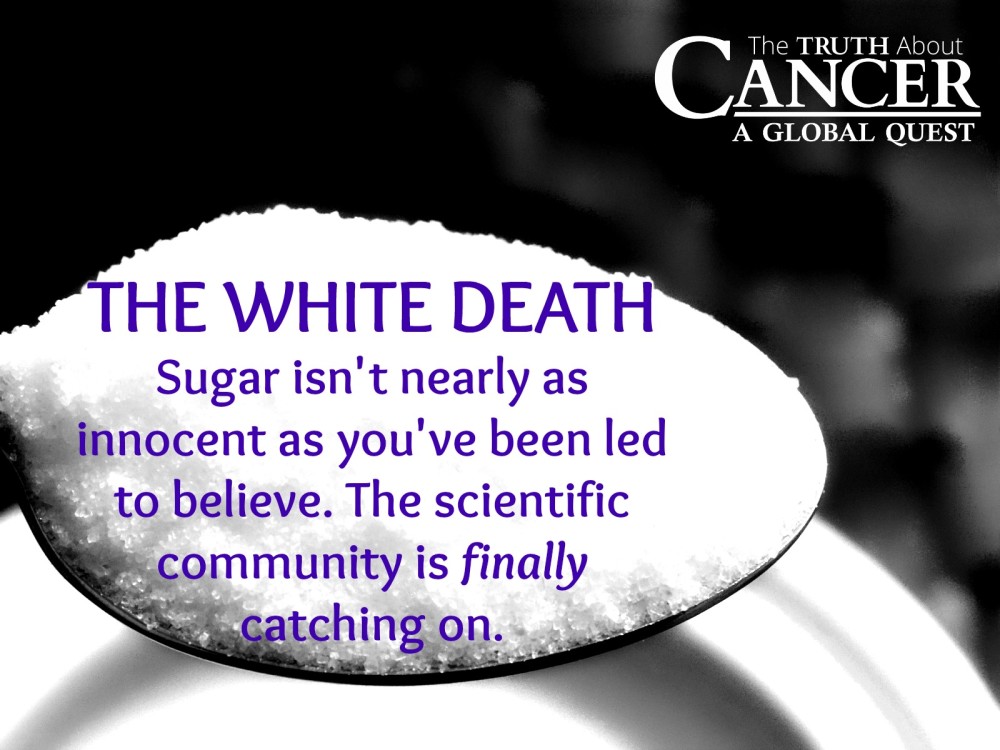Why Sugar Is Called "The White Death" and the Sugar Cancer Connection

As good as it may taste, sugar is NOT your friend. It may “feel” like your friend when it comforts you (due to the beta-endorphin rush in your brain), but sugar is really your ENEMY.
Truth be told, regular consumption of sugary foods is one of the worst things that you can do for your health. Modern scientific research has shown us, beyond a shadow of a doubt, that sugar in your food (in all its myriad forms) is taking a devastating toll on your health.
Take a look at the sugar consumption trends over the past 300 years:
- In 1700, the average person consumed about 4 pounds of sugar per year.
- In 1800, the average person consumed about 18 pounds of sugar per year.
- In 1900, individual consumption had risen to 90 pounds of sugar per year.
- In 2012, more than 50% of all Americans consumed 1/2 pound of sugar per day — translating to a whopping 180 pounds of sugar per year!
In 1890, only 3 people out of 100,000 had diabetes. In 2012, almost 8,000 out of every 100,000 people was diagnosed with diabetes!
Creating Our Addiction to Sugar
The “sugar rush” has been targeted at our children. American children are consuming about 10 times as much sugar as they were in 1900, especially in the form of high fructose corn syrup (HFCS), which is the average American’s greatest source of calories! Highly addictive HFCS contains fructose and glucose, but they are NOT bound together (as they are in table sugar) so the body doesn’t need to break it down. Therefore, the fructose is absorbed immediately, going straight to the liver, which turns it into fat (VLDL and triglycerides).
According to Dr. Joseph Mercola:
“Fructose also tricks the body into gaining weight by fooling your metabolism (it turns off the appetite-control system). Fructose does not appropriately stimulate insulin, which in turn does not suppress ghrelin (the “hunger hormone”) and doesn’t stimulate leptin (the “satiety hormone”), which together result in your eating more and developing insulin resistance.” This process also suppresses the immune system.
But just because you avoid HFCS doesn’t mean that you’re in the clear. Excess intake of ALL processed sugars results in compromised immune function (decreasing the white blood cells’ ability to destroy bacteria), obesity, and diabetes.
And if that’s not enough, keep in mind that sugar is HIGHLY addictive! That’s right! Dr. Serge Ahmed of Bordeaux, France, has been working with rats and giving them the choice between cocaine and sugar. Guess which one wins, time and again?
That’s right… sugar!
It turns out that the sweet taste of sugar is more rewarding than the high of cocaine.
You see, sugar produces dopamine − a happy, feel-good chemical − in the brain. People get addicted to eating sugar, whereby they need it to feel “normal” and they undergo “withdrawal” if they cut sugar from their diets. If they go “cold turkey” for a few days, their brain will begin to produce dopamine on its own, but the discomfort of the withdrawal process keeps many “sugar addicts” trapped in their addiction.
What is the Sugar Cancer Connection?
Due to the anaerobic respiratory mechanism exhibited by ALL cancer cells, sugar is cancer’s favorite food! And since half of the white sugar in the USA comes from sugar beets, you should remember that most beets are now genetically modified. This is another reason to stay away from the “White Death,” isn’t it?
I personally recommend that you avoid white sugar, brown sugar, agave, and all artificial sweeteners such as aspartame/AminoSweet, sucralose, and saccharin. If you have a sweet tooth, it’s best to stick with 100% pure stevia, xylitol, raw honey, pure maple syrup, molasses, and coconut sugar.
The bottom line: if you want to be and stay healthy, you MUST take control of your sugar intake so that it doesn’t take control over you.
Ending the Sugar Confusion
It’s easy to become confused by the various sugars and sweeteners, so here is a basic overview:
- Saccharide = sugar
- Glucose (aka “dextrose” or “grape sugar”), galactose (“milk sugar”), and fructose (“fruit sugar”) are all “monosaccharides” (i.e. single sugar molecules), known as “simple sugars.” The primary difference between them is the way your body metabolizes them.
- Glucose is a form of energy you were designed to run on. Every cell in your body uses glucose for energy.
- High amounts of fructose are very damaging to the body if it isn’t burned immediately for energy because it travels directly to the liver where it’s converted to triglycerides (fats). Excess triglycerides increase insulin resistance (and insulin production), thus contributing to diabetes in a “back door” fashion.
- The simple sugars can combine to form more complex sugars, like sucrose (“table sugar”) which is a “disaccharide” comprised of 50% glucose and 50% fructose.
- “Refined” white sugar (pure sucrose) is washed with a syrup solution, then with hot water, clarified (usually chemically) to remove impurities, decolorized, concentrated, evaporated, re-boiled until crystals form, centrifuged again to separate, then dried. By this point, any remnants of “natural goodness” and “nutritional value” have completely disappeared! Quite frankly, white sugar should be considered an “industrial product” rather than “food.”
- “Brown sugar” is white sugar mixed with molasses.
- “Raw” sugar is not really raw. It has been cooked, and most of the minerals and vitamins are gone. But it’s probably a little better than refined white sugar because it has a little of the molasses remaining.
- Aspartame or AminoSweet is a neurotoxic rat poison… need I say more?
- Splenda (sucralose) is NOT a sugar, despite its deceptive marketing slogan, “made from sugar.” It’s a chlorinated artificial sweetener in line with aspartame, though not quite as harmful.
- Honey is approximately 50% fructose, but in natural (raw and unpasteurized) form contains many health benefits. Buying honey that is local and unpasteurized is best.
- Stevia is an extremely sweet herb derived from the leaf of the South American stevia plant, which is completely safe (in its natural form). Green stevia is the whole plant, while white stevia is processed and can often contain other ingredients like natural flavors or dextrose − a form of sugar. 100% green stevia in its natural state is what you want.
- Agave nectar is made from the agave plant, which is a cactus. Sounds natural, right? Like maple syrup from a tree, or honey from a beehive. Only it isn’t. Agave is HIGHLY processed while the end product does not even remotely resemble the original agave plant. Furthermore, agave is approximately 80% fructose (much higher than honey and maple syrup).
- HFCS (high fructose corn syrup) is 55% fructose and 45% glucose. It is mostly genetically modified. Stay away!
- Rapadura is the pure juice extracted from the sugar cane (using a press), which is then evaporated over low heat, whilst being stirred with paddles, then sieve ground to produce a grainy sugar. It has not been cooked at high heats or spun to change it into crystals, and the molasses is maintained in the sugar. “Sucanat” is the USA trade name for Rapadura.
- Coconut sugar is made from the sweet watery sap that drips from the cut flower buds of the coconut palm. It has a low glycemic index (GI) and is rich in amino acids. It is typically less than 10% fructose, with sucrose being the primary component.
- Xylitol is a sweetener known as a “sugar alcohol” (or polyol). Sugar alcohols are neither sugars nor alcohols − they are carbohydrates (with structures that happen to resemble sugar and alcohol). Xylitol is extracted from corn or birch cellulose. Unlike sugar, Xylitol is slowly absorbed, does not cause a rapid blood sugar increase, and does not require an immediate insulin response from the body to be metabolized. Moreover, many studies have shown that it actually helps prevent dental cavities, ear infections, and some evidence suggests that it helps prevent gum disease because Xylitol is anti-bacterial. However, Xylitol does have some potential health side effects (most notably gastrointestinal issues) and should be used with caution.
Stay informed and don’t miss a single article or interview from The Truth About Cancer. Go here to be notified each week about new, cutting-edge information that impacts your health.



Or read his book, How Not To Die.
Bill